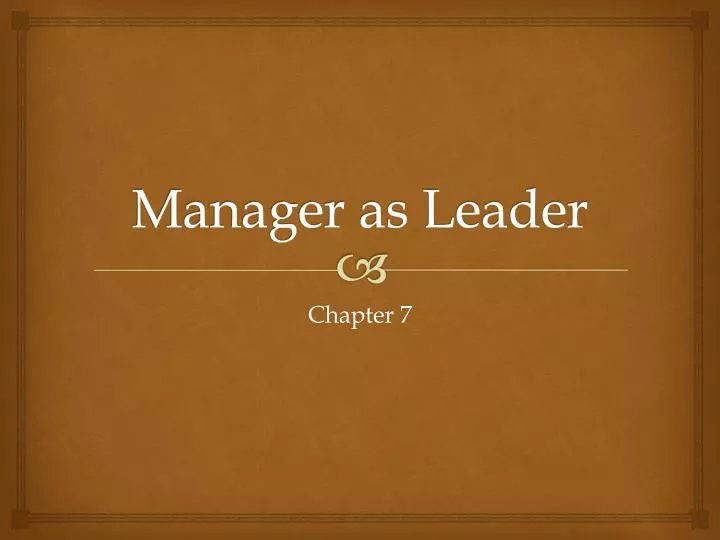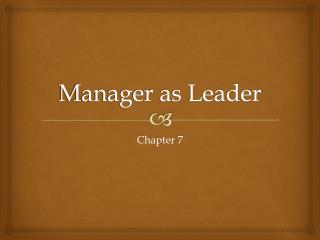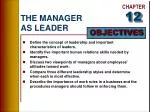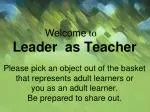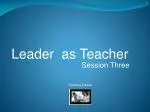
Manager as Leader
Presentation Transcript
Manager as Leader Chapter 7
The Importance of leadership • Managers are the people who are responsible for making sure that resources are used effectively, so that the business is successful. • In the past, it was believed that managers just had to tell employees what to do and the work was done. • When employees do not feel involved in decisions they will not be as committed to the work. • People are the most important resource of a business. • It is one of the business highest expenses • Today managers are expected to do more then to just give orders. A managers must be an effective leader. • Leadership- is the ability to influence individuals and groups to accomplish important goals. • Human relations- is the way people get along with each other.
The importance of leadership • Leadership Characteristics: • Understanding • Initiative • Dependability • Judgment • Objective • Confidence • Stability • Cooperation • Honesty • Courage • Communication • Intelligence • http://www.mybigcampus.com/library/168064
The importance of leadership • Developing leadership characteristics • For some people leadership is a natural characteristic • You do not need to be a manager to be a leader. • Developing leadership • Study leadership by reading books on leadership and leadership skills. classes • Participate in organizations and activities: clubs, teams, ect… • Practice at work or at school. Develop leadership skills by helping customers, complete work assignments, and by taking the initiative. • Observe leaders http://www.mybigcampus.com/items/they-will-never-take-our-freedom-braveheart-3-9-movie-clip-1995-hd---4237156 • Work with a mentor • Do a self-analysis and ask for feedback • Teachable • Being able to handle criticism
12 Most Magical Leadership Lessons from Disney Animated Movies • Beauty and the Beast: don’t force love; earn it • Aladdin: just be yourself • The Lion King: it’s your kingdom; if you don’t fight for it, who will? • Toy Story: you’re not a space ranger… and that’s okay • Hercules: being a hero isn’t about celebrity; it’s about sacrifice • Mulan: being true to yourself is the greatest gift you can give to others • Dinosaur: the strong are morally responsible for the weak • The Emperor’s New Groove: it’s not about you • Monsters Inc.: innovation powers your world • Finding Nemo: nothing can stop you from finding what is most precious to you • The Incredibles: don’t let the mediocre silence your awesomeness • Tangled: to make your dreams come true, you’ve got to leave your tower
Human Relations • Managers and leaders must be able to work well with other people. Majority of a managers time is spent interacting with people. **The way people get along with each other.** • Human relations largely determines whether a manager is successful or not. They must develop effective human relations skills. • 1) self understanding • 2) understanding others • 3) communication • 4) team building • 5) developing job satisfaction
Self Understanding • A leader must understand their own strengths and weakness. • A manager cannot be viewed as either unpredictable or unfair. • Managers must identify effective ways to communicate and work with other individuals. • Understand how you make decisions • Always need to be willing to improve and to learn.
Understanding Others • Leaders recognize that people in a business of ten have more things alike than different. • Recognizing similarities will help develop a stronger team. • Differences can improve a business • Leaders get to know each person and is able to identify each persons strengths and weaknesses. • They will not treat everyone the some but will attempt to involve each person that is beneficial for the company.
Communication • Leader must have effective communication skills. There are different types. • Formal or Informal • Formal communication have been established and approved by the organization. • **Informal communication are common but unofficial ways that information moves in an organization. Respected employee** • Internal or External • Internal communication is between managers, employees, and work groups • External communication is between inside the organization and outside. Customer service
CommunicationCont. • Vertical or horizontal • Vertical communication moves up and down in an organization. Ex manager and employees • Horizontal communication moves across the organization at the same level. Ex Manager to Manager. • Oral or Written • Oral communication is word of mouth • Written communication are letters, notes, email messages, ect…
Team Building • Businesses are made up of groups and teams, not individuals. • Issues with the team or group it will not be as effective for the company • Managers need group-building skills to help people understand each other and their responsibilities. • Managers need to be able to identify any problems and be able to help solve the issue quickly.
Developing Job Satisfaction • Managers can influence how employees feel about their jobs on a daily basis. • Many things can lead to job dissatisfaction, such as regular assignments employees do not like or do not feel prepared for. • Poor working conditions • Daily difficulties • When managers pay attention to needs and concerns of individual employees, employees appreciate the effort.
Influencing People • Effective leaders must be able to influence members • Position Influence: is the ability to get others to accomplish tasks because of the position the leader holds. Ex promotion • **Reward Influence**: results from the leader’s ability to give or withhold rewards. Positive or negative • Expert Influence: arises when a group member recognize that the leader has a special expertise in the area. Ex successful salesman • Identity Influence: stems from personal trust and respect members have for the leader. Best interest of the team • If a manager is not viewed as an expert and is not well liked they will have to rely on position and reward influence. • Most leaders try to develop expert and identity influence.
Pros and Cons of Different Leadership Styles • Managers approach the task od leading a group in different ways based on their leadership style. • **Leadership style**: is the way a manager treats and directs employees. • **Tactical Management**: is where the manager is more directive and controlling. Close contact with employees to make sure the task is completed on time. **Deadlines** • Strategic Management: is where managers are less directive and involve employees in decision-making. Trust employees to work without direct supervision and seek advise on important decisions. • Mixed Management: The combined use of tactical and strategic management
Employer/Employee Relations • Managers and employees want their business to succeed. Both do not always have the same goals • Managers must make sure the company makes a **profit**, so they get more work done at a lower cost. • Employees are more concerned about pay, working conditions, and job security.
Labor Unions • In the 20th century many US business did not treat their employees well. Thus creation on labor unions. • Labor Union is an organized group of employees who negotiate with employers about issues such as wages and working conditions. Represent a large number of employees. • 1940 and 1950 more than 1/3 of US labor force was unionized. • **Today that number has greatly reduces to less then 15%**
